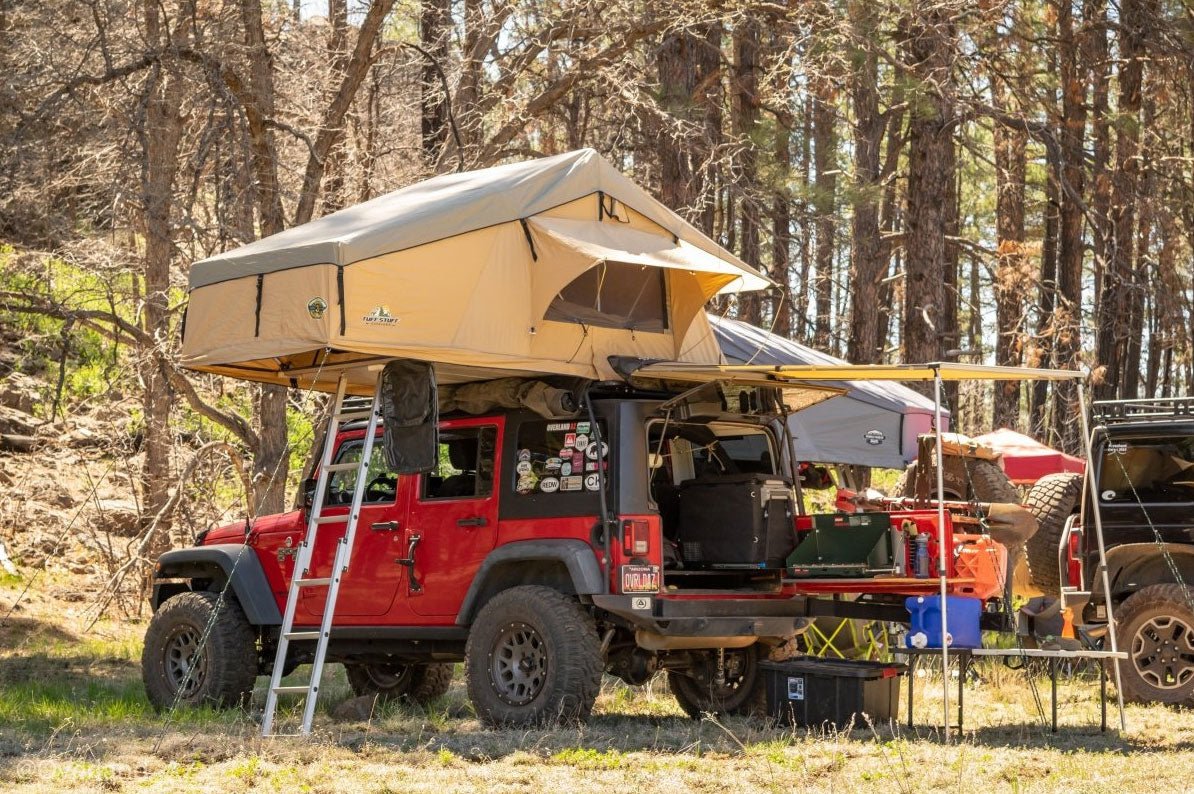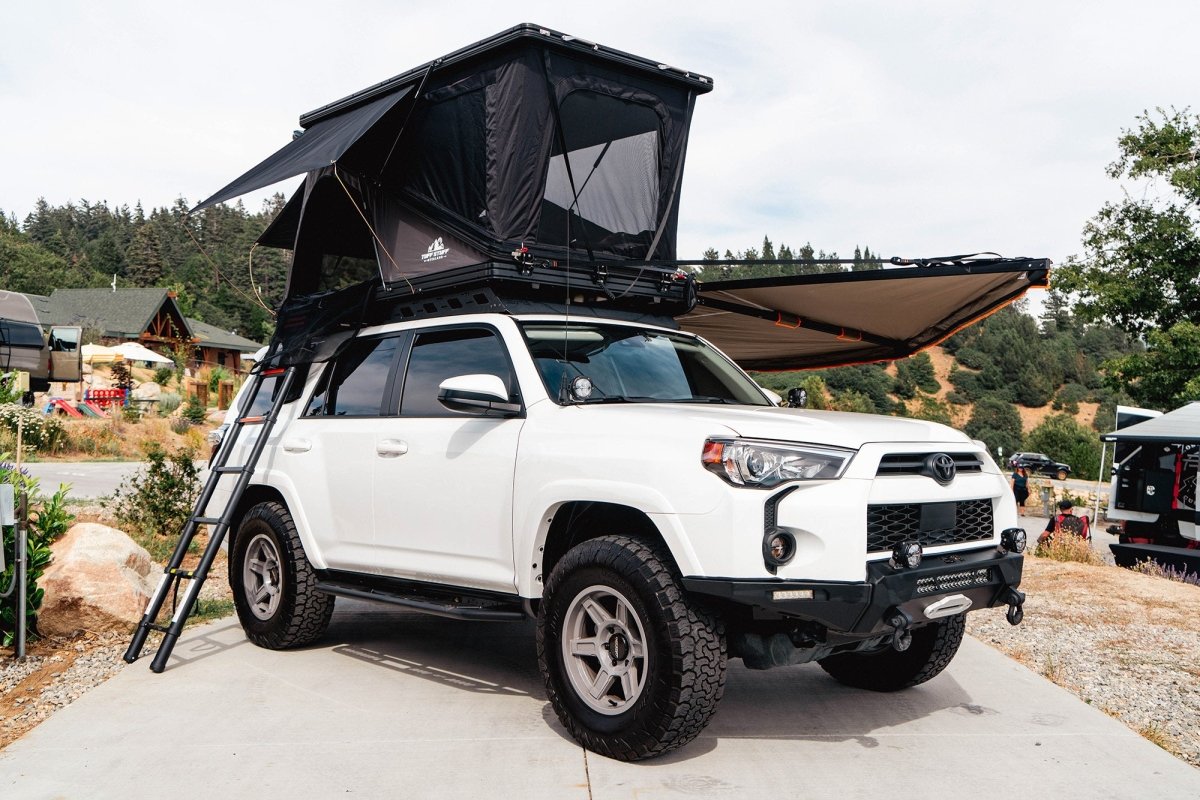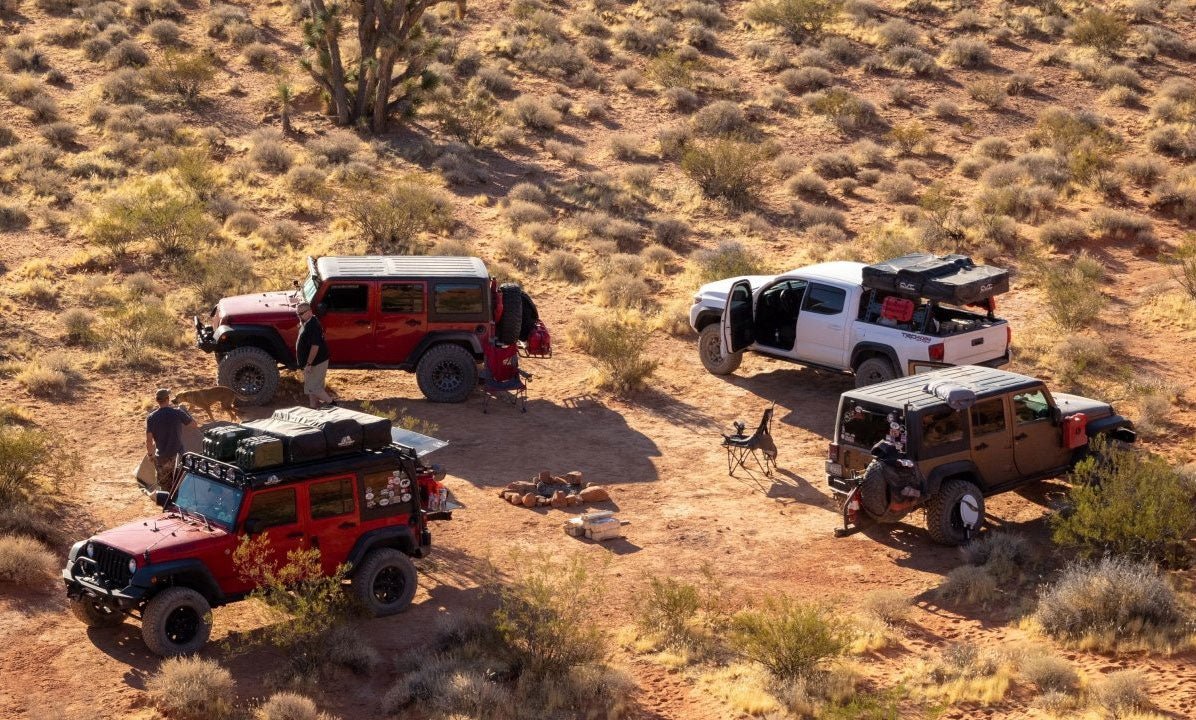Are you planning to try out overland camping? For the new or novice overland camper, preparing for the expenditure might as well be te most difficult part of the adventure. How do you know you are not going to forget an important gear or equipment and end up stranded in the wilderness with no other substitute to help you?
That’s a scary thought, isn’t it?
To help you avoid this inconvenience, we have compiled a detailed list of the essential items and overlanding gear any overlander will need on their adventure. Get your notepad and pens out and let us prepare you for your next overland trip.

The Overland Business
For the unacquainted, overlanding is very different from a normal camping trip. As two different topics, they are approached in different methods and require different planning.
Overlanding or overland camping is a vehicle-dependent travel where the main objective is not the destination but the journey itself. It is a self-reliant adventure that tests the overlander’s strength, determination, navigation abilities, comfort, and ability to prepare for the worst.
Overland camping involves off-road vehicles designed to handle the rough terrain of the remote trails. It is usually a long journey that involves conquering trails or roads that are rarely travelled and going of the grid for weeks of even months.
In this period, the traveller relies on his vehicle for shelter, gear for survival, and mindset for the success of his trip. Where the basic camping trip sounds like sunshine and rainbows, overland camping sounds like toughness and physical and mental challenges.
Going overlanding means you will not have the basic amenities enjoyed in civilization and campgrounds. You have to rely on the gear you pack for everything from power to feeding.
This implies that you must bring every piece of equipment that might facilitate your survival and ease any challenge you might face on your journey. However, with the limited space in your vehicle, you simply cannot bring along every equipment.
Overland camping isn't luxury so you should only bring along what is necessary. This requires careful planning, checking your inventory, checking and cross-checking to ensure you have the necessary tools in your vehicle.
Forgetting any overlanding gear can make your journey a miserable one. To help you avoid this, we have provided a list of essential gear you will need.
The Essential Gear List For Overland Camping
If you plan to leave comfort for the harsh conditions and the emptiness of the wilderness, it makes sense to prepare yourself. You don’t need to break your bank for the latest high-tech and macho survival tools. All y gear you need on your subsequent are affordable and within easy reach.
When choosing your overland camping gear, you need to consider two important factors;
- Multi-purpose ability: some overland camping gears are created to serve several purposes. This limits the number of equipment you have to carry and saves space. Multi-tools combine individual tools with different functions into one build. A hatchet can be a knife, hammer, and even a keychain.
- Size: the size and weight of an equipment is crucial when packing your overland camping gear. With limited space, you don't want to pack unnecessarily large tools that will short-change your ability to pack more important gear. Always remember to keep your load light and small to make it easier to fit more equipment in your vehicle.
Some of the necessary gear for overland camping includes:
1. A Vehicle
If you already have a vehicle to use for your expenditure then you can skip this one. If you don’t then this is essential.
Unsurprisingly, to go on an overland expenditure, you need to have a vehicle for movement. However, not just any vehicle will do. You need to have one that is equipped with overland and off-roading abilities.
The success of your overland quite honestly depends on the vehicle you employ for the trip as it is the most important gear on any overland camper’s list. In your search for a vehicle, you will undoubtedly have come across several types of trucks and trailers but setting for just any vehicle is out of question. Purchasing an overland vehicle is an investment and you need to invest in a vehicle that will serve its purpose for as long as necessary.
On an overland trip, you will undoubtedly have to pass through rough terrain and often in adverse conditions. To do this, you need a vehicle designed to handle rough terrain and unimaginable weather conditions.
Whether old or new, van, trailer, or truck, it is essential that the vehicle you choose is built for rocky trails and dirt roads. This means having large tires with firm grip, good ground clearance, great hill descent control, a powerful engine, and other characters thtst promise resilience.
You also need to consider the size of the vehicle. This will not only affect its ability to be manoeuvred but the amount of gear it can fit. Your overland vehicle should not only be able to haul a maximum amount of gear to enable you to bring as much equipment as possible but also provide enough room for you and your companions.
2. Sleeping Gear
Rest is crucial after a long day of manoeuvring your vehicle through rugged territory and surviving the day. It helps you to feel refreshed and fuel for the next day.
Getting proper rest means getting a comfortable area to sleep and relax. However, without the luxury of their beds and comforters coupled with the lack of space, many campers often result in setting in their vehicle for the night. While that might be comfortable in larger vehicles like trucks and vans, it is not so for smaller vehicles like jeeps.
Tents are the next best option. While normal camping tents are a valid choice, rooftop tents have become a more popular albeit more pricey option among veteran campers.
Rooftop tents are erected on the roof of your overland vehicle. They provide above-ground shelter which is perfect for uneven terrain, protection from harsh weather (depending on the tent’s material), and a more comfortable sleeping area. Rooftop tents are easy to set up and erect after the initial installation on your roof using the in-built roof racks or separately bought crossbars.
Unlike a conventional camping tent, rooftop tents don’t require much effort to erect. However, they require more storage space for your ladder, and with conventional camping tents, your mattress, pillows, and blankets. To make this easier, some tents like the TuffStuff Alpha 4-person hard top tent are designed to hold beddings when closed and not in use.
When buying rooftop tents, make sure you pay attention to the specifications. Check out the installation method, size, weight, material, and accessories to ensure it is perfect for your trip.
Some rooftop tents come with inflatable or foam mattresses but if your tent option doesn’t, you will need a mattress in your preferred size, blankets fit for the weather, and pillows for extra comfort.
3. Navigation Tools
One of the joys of overland camping is that you abandon all hints of civilization to embrace nature. However, you are doing so on unfamiliar terrain, and unless you intend on getting lost and running into trouble, you will need navigation tools to find your way around.
Navigation tools can be anything from paper maps and compasses to a GPS-oriented device. As long as it works and helps you get around, it is worth having.
Paper Maps
Although this might sound old-fashioned, it contributes to the no-hint-of-civilization expenditure that many overland campers crave.
Paper maps are often used by veteran campers and people who are well-versed in reading maps as taking one wrong turn due to reading the map wrongly can cause an overland camper to end up lost.
In the wilderness, one thing you don’t want to be is lost. However, when read correctly, paper maps can be extremely effective navigation tools. Since they don’t rely on batteries and signals, you don’t have to worry about being stranded due to dead batteries, no power, or spotty signals.
There are maps of various areas and on different scales. All you need to do is find an up-to-date backcountry map of the areas of your expenditure. Maps are still being printed and sold today so you should just find a trusted source to buy one from.
If you don't find an up-to-date map in a reliable store, you can opt for a hardcopy Nat GEO PDF Quad map.
GPS-oriented Mapping Devices
Although one of the joys of overlanding is leaving technology and the society to tackle the wild on your own, compromising your safety and getting lost defeats the sole purpose of your expenditure. If you want stress-free and accurate navigation and navigation during your overland trip, GPS mapping devices and trackers are a great option.
GPS maps work by connecting to satellites to determine your location. They can help you determine your latitude, longitude, elevation, and time. GPS maps built for overlanding can be bought in overland shops. These maps contain specific overland routes and backcountry directions.
Some of these devices are built to military-standards and are designed to tolerate harsh weather conditions. Most modern mopping devices dont require internet connections to function but since these devices use batteries, you may need to purchase extra batteries or provide power supply.
4. Tables And Chairs
Although the main focus of overland camping is on the trip, you can take time off to unwind and enjoy the scenery. If you have been going at it for a while, you can pause to sit and catch your breath.
Although it doesn’t occur to first-time overland campers, tables and chairs are an essential part of an overland trip. Unless you plan on driving all day and only stopping at night, staying in your tent every time you take a break, or staying in your vehicle, that is. If you want to see the sky, enjoy fresh air, and enjoy the company of your overland partners, you better add a table and some chairs to your list
Tables and chairs are also perfect kitchen equipment. Who says you cannot have dinner on a table and chair like you do at home? Don’t just pack any table and chair. Folding chairs and collapsible tables are better options as they are easier to pack and lug around.
5. Lighting
Do you know another thing you will miss on your overland camping trip? Electricity. The sight of a light switch. Your bedside lamp.
It will get dark on your overland trip and when it does, you need to be prepared. This means bring flashlights, headlamps, LED lights, or even lanterns as a lighting source to help you make your way around.
Having proper lighting after sunset will help you get things done even in the blanket of darkness. It will help you prepare dinner at night, prepare to go to your makeshift bed, and generally just safeguard you from accidents waiting to happen at night.
When packing light sources, it is preferable to pack solar-powered ones if possible as this will enable you to charge them in the day using the sun. if this is not possible, you can opt for battery-powered light sources. Remember to pack extra batteries and a portable electrical source.

6. On-the-go Kitchen Supplies
Having the right kitchen gear and supplies will help you stay nourished on your overland camping trip. Don’t fret, you don't need anything luxurious like a four-face gas cooking stove. However, you do need a stove and a bunch of other food and cooking items.
All you need in your overland kitchen is basic camping essentials but planned for long-term use. Overlanding is not a weekend affair. It can last months to years and you will need to be fully prepared.
Your kitchen store should contain:
- Dry and non-perishable food
- Pots and pans
- Water filter
- portable gas or multi-fuel (runs on different fuel types like diesel, kerosene, and gasoline) camping stove
- portable refrigerator
- other cooking and eating utensils like plates, cups, spoon, knives, tongs, and more.
- Collapsible vinyl sinks or large bowls to do the dishes in
- Dish towels and soap
Remember to pack equipment that can serve multiple purposes.
7. First-Aid Kit
Emergencies can happen anywhere and the middle of the wilderness is ot an exception. The best way to stay safe during your expedition is to prepare for the worst.
A first-aid kit is a non-debatable need on an overland trip. While staying safe should be a priority, having a solution to any accident, no matter how minor or major, should remain an equal priority.
From cuts to burns, your first-aid bag should be filled with supplies for any need. They should also contain supplies for allergies and your necessary medication. The best part of this is first-aid supplies hardly take up any space.
Your first-aid kit should contain:
- Bandaids and adhesive bandages
- Alcohol swabs antiseptic wipes
- Ibuprofen or other painkillers
- Antibacterial and antibiotic creams
- Electrolyte packs
- Sterile guaze pads
- Oral thermometer
- Tweezers
- Scissors
- More than two pairs of non-latex gloves
- Instant cold compress
You can also add anything else you think you may need and hope you do not need them.
8. Camping Shower And Toilet Essentials
Although you don't have access to hot tubs and high-pressure showers, you there are other options you can make do with on your overlanding trips. However, you should keep it in mind that you won,t get the luxury you are privy to at home or at camping grounds.
Unless you plan to swim in the lake everytime you need a bath, you need to plan your bathing properly. There different adaptations you can employ like dumping water from a bucket over your head using a smaller bowl or using a low-pressure gravity camping shower. There are different types of camping showers but many of them use compress air to pressurize the water out of the showerhead that you hang on the roof of your vehicle or on a tree branch.
There are also shower tents designed to provide privacy while you bath. This way, you can have a refreshing shower without being worried of being exposed or flashing other overland campers.
Going to the toilet is another problem you face on overland camping expenditures. When it comes to doing your business, you don’t have a lot of options.
When choosing the best way to do your business, you need to consider how long your expenditure will last, your budget, availability of water, and ease of cleaning. Options range from digging a hole in the floor and covering it back up to using disposable bags and portable potties.
Remember to bring cleaning supplies like toilet paper and soap.
9. Recovery Equipment
Your trusty vehicle might take a hit from the rocky or muddy terrain and breakdown or worse. When this happens, you need to be prepared to fix the problem and get moving quickly.
Packing the right recovery equipment is your investment against getting yourself out of any vehicle problem. You are not exactly in a place o call on a mechanic so it would be better if you not only have the gear to help but also the technical knowledge of applying and using the gear.
Some essential recovery equipment include:
- Power winch
- Lift jack
- A spare tire
- A deflator
- A jerry can filled with extra fuel
- An air-compressor that hooks up to the cigarette lighter in your vehicle
- Wrenches
- Spanners
- A crow bar
- Duct tape
- Brake fluid
- Air filters
- Fuel filters
10. Fire Extinguisher And Fire Blanket
Never say never when it comes to safety on overlanding trips. Fire accidents can happen without warning and having fire extinguishers on site will keep you, your companions, and even your vehicle safe.
Bonus: Essential Gear You Might Forget
When packing for your overland trip, you might make the mistake of bring only the major items that you might forget the little yet important things. Don’t forget to pack:
- Power adapters
- Sun block
- Hats or headwarmers depending on the weather
- Suitable clothing
- A pee bottle
- A radio and books you fancy for entertainment
Being Prepared Is All That Matters
What happens when you blow out a tire? Or when minor accidents happen, and you get small cuts and scrapes?
Being prepared is an excellent way to have a safe and successful overland camping trip. Knowing that you have a solution to whatever unplanned event or situation might creep up on you will help you be at ease.
This list is curated to help you stay safe on the go, and all you need to do is pack each item off this list. Remember to pack consciously and do not take more than you need or can carry.



